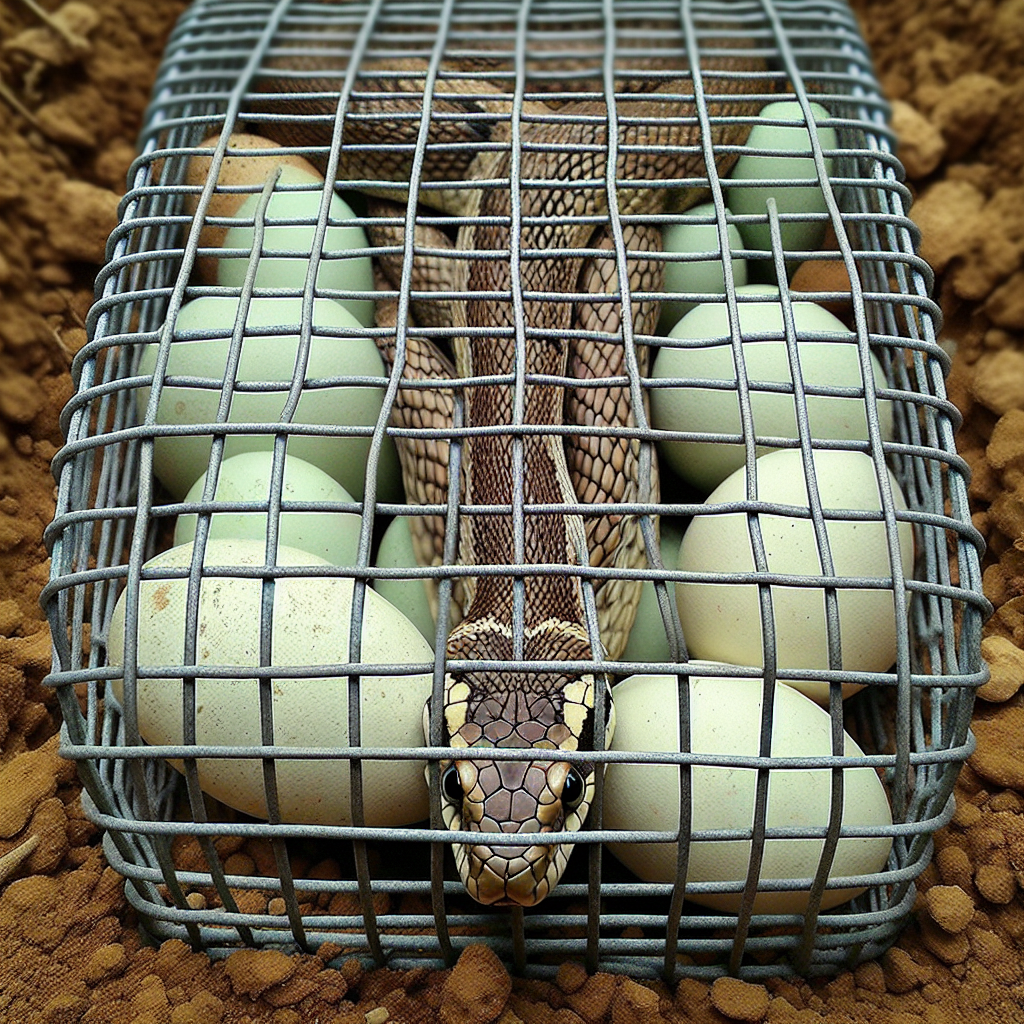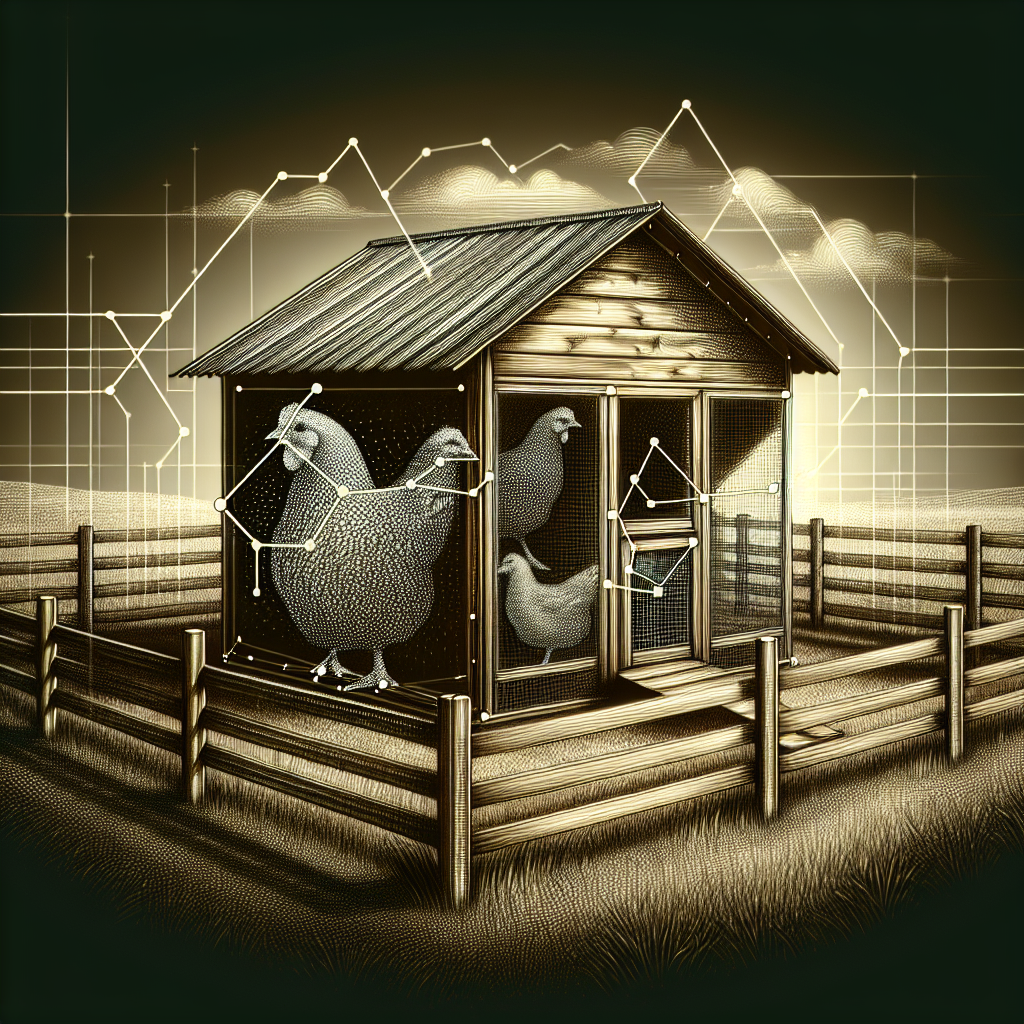Are you tired of constantly losing eggs or chicks to pesky snakes? Look no further! In this article, we will explore effective strategies that you can employ to put an end to this snake-induced tragedy. From simple preventative measures to more advanced techniques, you’ll discover a range of options that will help you protect your precious eggs and chicks, ensuring their safety and your peace of mind. Don’t let snakes ruin your valuable eggs or jeopardize the growth of your young chicks any longer; it’s time to take action!
Natural Deterrents
Introduce Predators
One effective way to deter snakes from preying on eggs or chicks is by introducing predators to your property. Predators such as certain species of birds, cats, or even small dogs can help keep the snake population in check. Snakes are natural prey for many animals, so having natural predators around can create a deterrent for them.
Create a Protective Barrier
Another natural deterrent is to create a protective barrier around your coop or nesting area. This can be done by using materials such as rocks, thorny bushes, or even a wall. Snakes are not fond of crossing such barriers and are more likely to steer clear of the area altogether.
Use Predator Urine
Predator urine is another natural deterrent that can be effective in keeping snakes away. This can be obtained from stores that sell hunting supplies or online. By sprinkling predator urine near the nesting area, you create the illusion of danger for snakes and discourage them from approaching.
Plant Snake-Repelling Plants
Certain plants are known to repel snakes due to their strong smell or texture. Plants such as marigolds, wormwood, and garlic can act as natural deterrents. By strategically planting these around your property, you can create an unfavorable environment for snakes and reduce the likelihood of them targeting your eggs or chicks.
Habitat Modification
Eliminate Hiding Places
Eliminating potential hiding places is crucial in discouraging snakes from preying on eggs or chicks. Clear away any piles of debris, rocks, or unused items that may provide hiding spots. Regularly trim tall grass and bushes to eliminate hiding places for snakes as well.
Keep Surroundings Clean
Maintaining a clean environment is important to deter snakes. Remove any food sources, such as spilled grains or birdseed, that may attract rodents. By eliminating the availability of prey, you make your property less appealing to snakes.
Remove Attractive Features
Certain features, such as bird feeders or water sources, may attract snakes indirectly by drawing in potential prey. Consider relocating or removing these features from areas near the nesting site to discourage snakes from venturing too close.
Physical Barriers
Install Snake Fencing
One of the most effective ways to physically deter snakes is by installing snake-proof fencing around your coop or nesting area. Snake fencing typically consists of a mesh material buried a few inches into the ground to prevent snakes from slithering underneath it. This provides a strong physical barrier to keep snakes out.
Use Mesh Wire Cages
In addition to snake fencing, using mesh wire cages can provide an extra layer of protection for your eggs or chicks. These cages can be placed over the nesting area or individual nests, ensuring that snakes cannot access them. Make sure the mesh size is small enough to prevent snakes from entering.
Apply Snake-Proof Netting
For smaller enclosures or specific areas, snake-proof netting can be a practical solution. This netting is made of durable material and is designed to prevent snakes from squeezing through. By securely covering vulnerable areas with snake-proof netting, you can effectively prevent snakes from reaching your eggs or chicks.
Egg and Chick Protection
Provide Nest Boxes
Providing nest boxes for your hens or other nesting birds can be an effective way to protect their eggs and chicks from snakes. Nest boxes provide a safe and enclosed space for birds to lay their eggs, making it more difficult for snakes to access them.
Make Elevated Platforms
Creating elevated platforms or perches for your chicks can help keep them out of reach from snakes. Snakes are less likely to climb heights to reach their prey, so elevating the chicks’ resting spots provides an added layer of protection.
Use Protective Cages
If you have specific chicks that are particularly vulnerable, such as those who are sick or weak, using protective cages can be beneficial. These cages can be placed within the coop or nesting area, providing a secure enclosure that snakes cannot penetrate.
Create False Nests
Creating decoy or false nests can divert the attention of snakes away from the actual nesting area. These false nests can be made using materials such as straw or leaves and should be placed at a distance from the real nests. By luring snakes to the decoy nests, you increase the chances of them leaving the eggs or chicks unharmed.
Predator-Proof Coops and Enclosures
Reinforce Structures
Ensuring that your coops and enclosures are properly reinforced is essential in preventing snakes from gaining access. Secure any loose or weak areas, including doors, windows, and vents. Snakes can squeeze through small openings, so reinforcing these structures with sturdy materials is important.
Seal Openings and Gaps
Inspect your coop and nesting area for any openings or gaps that can serve as entry points for snakes. Seal these openings with materials such as caulk or wire mesh to prevent snakes from slipping through. Pay close attention to areas where electrical wires or plumbing enter the structure, as these can provide easy access for snakes.
Cover Entry Points
Covering entry points, such as vents and windows, with fine mesh screens can further deter snakes from entering. Make sure the mesh size is small enough to prevent snakes from squeezing through. Regularly inspect these screens for any damage or wear and replace as needed.
Install Snake Traps
For added protection, consider installing snake traps around your coop or nesting area. These traps are designed to capture snakes without harming them and can be an effective way to remove any snakes that manage to enter your property.
Remove Attractants
Keep Food Sources Secure
Snakes are attracted to areas where they can find food, so it’s important to keep potential food sources secure. If you have chickens or other small animals, ensure their food is stored in tightly sealed containers. Additionally, clean up any spilled food promptly to avoid attracting rodents, which can in turn attract snakes.
Avoid Overwatering
Overwatering your property can create an environment that is attractive to both prey and snakes. Snakes are attracted to areas with abundant water sources, as these areas tend to have a higher concentration of potential prey. Be mindful of your watering practices to keep your property less appealing to snakes.
Properly Store Pet Food
If you have outdoor pets, such as dogs or cats, make sure their food is stored securely. Leaving pet food outside can attract rodents, which can then attract snakes. Store pet food indoors or in tightly sealed containers to avoid creating an unintentional invitation for snakes.
Remove Debris and Clutter
Snakes are drawn to areas with plenty of hiding spots, so it’s important to remove any debris or clutter that can provide shelter. Regularly clean up fallen branches, leaf piles, or unused materials. By keeping your property clean and free of potential hiding spots, you decrease the likelihood of snakes taking up residence.
Consistent Surveillance
Frequent Visual Inspections
Regularly inspecting your coop and nesting area can help detect any signs of snake activity early on. Look for shed skin, droppings, or any evidence of snakes attempting to enter. By catching these signs early, you can take necessary actions to prevent snakes from preying on your eggs or chicks.
Use Trail Cameras
Using trail cameras can provide a constant surveillance of your property, even when you’re not physically present. Place these cameras strategically around your coop or nesting area to capture any movement or activity. Reviewing the footage can help identify if snakes are becoming a problem and allow you to take immediate action.
Monitor Chicken Behavior
Keep a close eye on the behavior of your chickens or nesting birds. Chickens are naturally alert to predators, so any signs of distress or unusual behavior may indicate the presence of snakes. If you notice any unusual behavior, investigate the area carefully to identify and remove any potential threats.
Proper Waste Management
Dispose of Waste Properly
Properly disposing of waste, such as chicken droppings or food scraps, is crucial in minimizing the presence of snakes. Seal waste in airtight bags or containers and dispose of it in a secure manner. Avoid leaving waste exposed, as it can attract rodents, which are a food source for snakes.
Secure Compost Bins
If you have compost bins on your property, make sure they are properly secured. Snakes are attracted to compost bins, as they can find both shelter and potential prey within them. Use tightly fitted lids and ensure there are no gaps or openings that would allow snakes to enter.
Avoid Leaving Scraps Exposed
When feeding your chickens or other animals, avoid leaving food scraps exposed for extended periods. The smell of food can attract both rodents and snakes, so by promptly removing any uneaten food, you reduce the chances of attracting these unwanted visitors to your property.
Lighting and Noise
Install Motion-Activated Lights
Installing motion-activated lights around your coop or nesting area can help deter snakes. Snakes prefer dark areas and can be startled by sudden bright lights. By illuminating the area when motion is detected, you create an environment that makes snakes uncomfortable and less likely to approach.
Apply Solar-Powered Deterrents
Solar-powered deterrents such as ultrasonic devices or LED lights can also be effective in keeping snakes at bay. These devices emit vibrations or sound waves that are unpleasant for snakes and can deter them from approaching. Place these deterrents strategically around your property for maximum effectiveness.
Use Noise Repellents
Certain noises, such as high-pitched sounds or vibrations, can act as deterrents for snakes. There are commercially available noise repellents specifically designed for deterring snakes. Place these devices near the nesting area to create an uncomfortable environment for snakes and discourage their presence.
Educate Yourself and Seek Professional Help
Learn About Snake Behavior
Educating yourself about snake behavior and habits can greatly assist in preventing them from preying on eggs or chicks. Understand the types of snakes that are common in your area, their breeding seasons, and their preferred habitats. This knowledge will help you implement the most effective prevention strategies.
Consult Local Experts
If you’re unsure about the best course of action to protect your eggs or chicks from snakes, it’s always a good idea to consult local experts. Contact local wildlife organizations, extension offices, or snake removal services for advice tailored to your specific situation. They can provide valuable insights and guidance to help you address the issue effectively.
Hire Wildlife Control Services
If you’re facing a severe snake infestation or are unable to manage the problem on your own, hiring professional wildlife control services may be necessary. These professionals have the knowledge, experience, and tools to safely remove snakes from your property and implement long-term prevention measures.
By employing these strategies and taking proactive measures, you can effectively prevent snakes from preying on your eggs or chicks. Remember to always prioritize the safety and well-being of your chickens or nesting birds while implementing these prevention methods.




